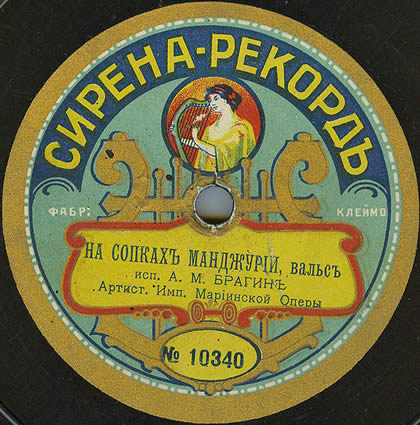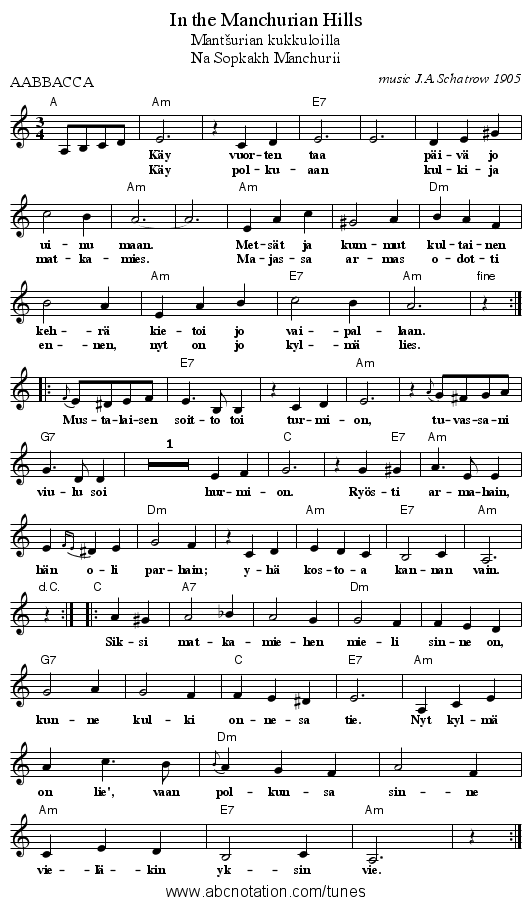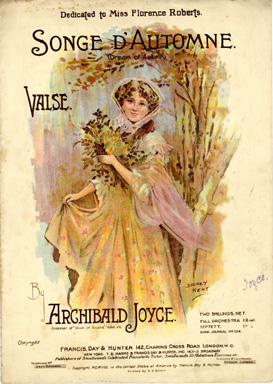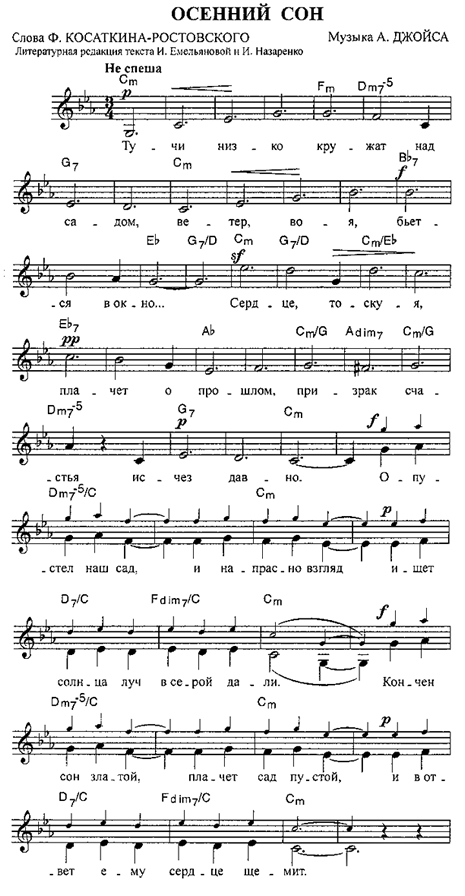Home-->m-master-000-eng-->m-master-039-3-eng |
PC |
|
Introducing three popular foreign waltz In the 1950s and 1960s in China-3 (Continued 039-2) |
||
In (On) the hills of Manchuria |
||
На сопках Маньчжурии, Na sopkah Manchzhurii |
||
(Continued 039-2)Now introducing third music: A famous Russian waltz-In the hills of Manchuria. |
||
This is a military song, is the work of the Tsarist Russia. Song author И.Шатров Shatlov, written in 1905 during the Russo-Japanese War to commemorate the dead comrades in arms |
||
The music achieved colossal success, it is said that having published some 82 different editions of the piece. Soon after its publication, the poet Stepan Petrov provided the lyrics which contributed to its wider success. The original words concern fallen soldiers lying in their graves in Manchuria, but alternative words were adapted to the tune later, especially during Second World War. |
||
 |
||
 |
||
************************************************ |
||
Audition for "In the hills of Manchuria" |
||
001-"In the hills of Manchuria"(Bayan accordion 02'11")>>>>>> |
||
002-"In the hills of Manchuria"(Accordion 02'41")>>>>>> |
||
On the Hills of Manchuria |
||||||||||||||||||||
"On the hills of Manchuria" (Russian: На сопках Маньчжурии, Na sopkah Manchzhurii) is a haunting waltz (i.e. a waltz composed of mostly minor notes and sub-4th octave arrangements) composed in 1906 by Ilya Alekseevich Shatrov. The original and orchestral arrangement is written in E-flat minor while the folk arrangement is in F minor. The original title of the waltz was "The Mokshansky Regiment on the Hills of Manchuria" and referred to an incident during the Battle of Mukden, the disastrous final land battle of the Russo-Japanese War, when the Mokshansky Infantry Regiment was encircled by Japanese forces for 11 days, during which it sustained considerable casualties. Shatrov served in the regiment as bandmaster and composed the tune on returning from the war. While the regiment was stationed in Samara in 1906, he made the acquaintance of Oskar Knaube (1866-1920), a local music shop owner, who helped the composer to publish his work and later acquired ownership of it. "On the Hills of Manchuria" achieved colossal success and Knaube boasted of having published some 82 different editions of the piece.[2] Soon after its publication, the poet Stepan Petrov, better known by the pen-name of Skitalets, provided the lyrics which contributed to its wider success. The original words concern fallen soldiers lying in their graves in Manchuria, but alternative words were adapted to the tune later, especially during Second World War. During the 1990s the song was featured in two films. In Nikita Mikhalkov's Urga Close to Eden (1991), the drunken lorry driver Sergei has the notes tattooed on his back and later sings the song in a nightclub, with the band playing from his back. Then in the British-American Onegin (1999) it was used anachronistically as the tune played at Tatiana's naming day. |
||||||||||||||||||||
Russian composer Ilya Alekseevich Shatrov |
||||||||||||||||||||
Lyrics (Russia) |
||||||||||||||||||||
На Сопках Маньчжурии (1905)Муз. И.А. Шатрова. Слова С. Петрова (Скитальца)"Тихо вокруг, сопки покрыты мглой, 1905 г. |
||||||||||||||||||||
Lyrics (English) |
||||||||||||||||||||
The Hills of Manchuria (1905)Music by I.A. Shatrov, lyrics by S. Petrov (Skitalets) |
||||||||||||||||||||
Around us, it is calm. Hills are covered by darkness. Suddenly, the moon shines through the clouds, Graves hold their calm. The white glow of the crosses—heroes are asleep. The shadows of the past circle around, Recall again anad again the victims of battles. Around us, it’s calm; the wind blew the fog away, Warriors are asleep on the hills of Manchuria And Russian weeping is canot be heard. Dear mother is shedding tears, The young wife is weeping All like one are crying, Cursing fate, cursing destiny! Let kaoliang’s rustling[1] lull you to sleep, Rest in peace, heroes of the Russian land, Dear Fatherland’s sons. You fell for Russia, perished for Fatherland, Believe us, we shall avenge you And celebrate a bloody wake 1905 (From here) |
||||||||||||||||||||
Oil Painting "The Hills of Manchuria" |
||||||||||||||||||||
*********************************************** |
||||||||||||||||||||
Following are related VIDEO in China |
||||||||||||||||||||
Anna Karenina and Uolynsky at Manor
Ball >>>>>> |
||||||||||||||||||||
The Russian Federation Ministry of defense military band (03'04") >>>>>> |
||||||||||||||||||||
Vivaldi Orchestra (03'17") >>>>>> |
||||||||||||||||||||
14.9.15 China Tianjin University Sydney Russian Balalaika Orchestra (03'12") >>>>>> |
||||||||||||||||||||
Accordion Solo (02'11") >>>>>> |
||||||||||||||||||||
From "Urga" film (02'03") >>>>>> |
||||||||||||||||||||
From "Brest Fortress" Film (01'46") >>>>>> |
||||||||||||||||||||
The Hills of Manchuria in 1999 film "Onegin”(01'40") >>>>>> |
||||||||||||||||||||
Following are related VIDEO in YouTube |
||||||||||||||||||||
Ilya Alekseevich Shatrov - "On The Hills Of Manchuria" (02'52") >>>>>> |
||||||||||||||||||||
The Hills of Manchuria ( English subs) (02'21") >>>>>> |
||||||||||||||||||||
На сопках Манчжурии - On the Hills of Manchuria ( "Brest Fortress" Film) (02'50") >>>>>> |
||||||||||||||||||||
Na sobkach Mandjurie / "Urga" film (03'09") >>>>>> |
||||||||||||||||||||
"On the Hills of Manchuria" (Old Russian Waltz). НА СОПКАХ МАНЬЧЖУРИИ (Russian triangle 02'39") >>>>>> |
||||||||||||||||||||
На сопках Маньчжурии (02'47")>>>>>> |
||||||||||||||||||||
Олег Погудин "На сопках Маньчжурии" (commemorate the 100 anniversary of the first World War 03'20") >>>>>> |
||||||||||||||||||||
The following screenshots : Anna Karenina and Uolynsky at the prom |
||||||||||||||||||||
 |
||||||||||||||||||||
 |
||||||||||||||||||||
 |
||||||||||||||||||||
***************************************
|
||||||||||||||||||||
Finally, as the end of this paper, enclose a very beautiful waltz: Autumn Dream / Осенний сон |
||||||||||||||||||||
Audition for "Autumn Dream" |
||||||||||||||||||||
Orchestral music (05'57") >>>>>> |
||||||||||||||||||||
Accordion (03'43") >>>>>> |
||||||||||||||||||||
Female Solo (03'57") >>>>>> |
||||||||||||||||||||
ОСЕННИЙ СОН
|
||||||||||||||||||||
**************************************** |
||||||||||||||||||||
Archibald Joyce |
||||||||||||||||||||
Archibald Joyce (25 May 1873 – 22 March 1963) was an English light music composer known for his early waltzes. He first came to prominence with the publication of his Songe d'Automne Waltz (1908) which fast became a hit. The piece is in a minor key. The melody is in a relatively low tenor register. The following year he repeated this success with his Visions of Salome Waltz (1909) also in the same low-pitched minor-key style. He was billed by his publishers Ascherberg Hopwood and Crew as the "English Waltz King". His music was immensely popular with dance orchestras of the period together with amateur pianists. The piano solo sheet music for his waltzes sold in very large quantities in the UK. He continued primarily with his distinctive waltzes until the start of the WW1 period. His other principal hits during this period were Dreaming waltz (1911), Charming and The Passing of Salome waltzes (1912), 1000 Kisses and Always Gay waltzes (1913) and Remembrance waltz (1914).................(WIKI). |
||||||||||||||||||||
Archibald Joyce (25 May 1873–22 March 1963, age 89) conducted a salon orchestra in Great Britain in the Edwardian era that was so fashionable for balls and dances that he was known as the "English Waltz King",[1] conducting "the first modern dance band in Britain"[2] His most familiar waltzes are "Dreaming",[3] "Songe d'Automne" ("Autumn Dream") and "A Thousand Kisses", which Charlie Chaplin incorporated into the sound track he added to his silent classic The Gold Rush. (Here) |
||||||||||||||||||||
Following are related VIDEO in China |
||||||||||||||||||||
Orchestra(03'47")>>>>>> |
||||||||||||||||||||
Accordion (03'43") >>>>>> |
||||||||||||||||||||
Orchestra (05'39") >>>>>> |
||||||||||||||||||||
Following are related VIDEO in YouTube |
||||||||||||||||||||
Orchestra-Адмиралтейский оркестр Вальс "Осенний сон" (Джойс 05'11") ) >>>>>> |
||||||||||||||||||||
Bayan Solo-О. Джойс. Вальс "Осенний сон". Обр. Г. Шендерёва. Исп. А. Скляров (04'22") >>>>>> |
||||||||||||||||||||
Female Solo-Старинный вальс "Осенний сон" ( 03'56")>>>>>> |
||||||||||||||||||||
Male Solo-Эдуард ХИЛЬ Songe d'Automne (Осенний сон) ( 02'57")>>>>>> |
||||||||||||||||||||
***************************************** |
||||||||||||||||||||
You can search for more video |
||||||||||||||||||||
Finished January 23, 2017 |
||||||||||||||||||||
Search in the site |
||||||||||||||||||||
January 23, 2017 |
||||||||||||||||||||
|
||||||||||||||||||||
















